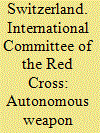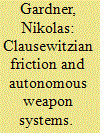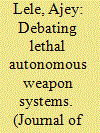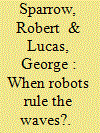| Srl | Item |
| 1 |
ID:
154508


|
|
|
|
|
| Publication |
Geneva, ICRC, 2016.
|
| Description |
94p.pbk
|
|
|
|
|
|
|
|
|
|
|
|
Copies: C:1/I:0,R:0,Q:0
Circulation
| Accession# | Call# | Current Location | Status | Policy | Location |
| 059138 | 355.8/SWI 059138 | Main | On Shelf | General | |
|
|
|
|
| 2 |
ID:
181995


|
|
|
|
|
| Summary/Abstract |
In the 1990s, Barry Watts assessed the impact of modern technology on the incidence of general friction in warfare, concluding that the participation of humans in wars made friction nearly impossible to eliminate. The advent of autonomous weapon systems (AWS), however, has the potential to reduce the role of humans significantly. This article considers the impact of AWS on the incidence of friction in future wars. Using Watts' taxonomy of general friction as an analytical tool, it argues that while these weapons have the potential to reduce friction resulting from human limitations, they will likely increase informational uncertainty, and unintended escalation.
|
|
|
|
|
|
|
|
|
|
|
|
|
|
|
|
| 3 |
ID:
164001


|
|
|
|
|
| Summary/Abstract |
Technology and the armed forces have a symbiotic relationship. Many technologies which are presently used in day-to-day life, like the Internet or navigation systems (global positioning system [GPS]), actually have a link to, or are derived from, military innovations. Artificial intelligence (AI) is one arena of present generation technology that militaries have been developing mainly for two purposes: first, for juxtaposing it on their existing defence architecture for its performance enhancement; and second, for developing new types of militarily instruments and weapon systems. The research and development to advance new lethal autonomous weapon systems (LAWS) has been bearing good results and a few such systems have already been fully operationalised. It is expected that ongoing advancements in LAWS is likely to establish a different context for their military applicability. This article discusses various aspects of autonomous and lethal autonomous weapon systems.
|
|
|
|
|
|
|
|
|
|
|
|
|
|
|
|
| 4 |
ID:
159088


|
|
|
|
|
| Summary/Abstract |
Robotic weapons are widely believed to be the future of war.1
Dramatic progress
in the science and engineering of robotics, alongside the perceived success
of the U.S. Predator and Reaper drones in Iraq and Afghanistan, has led many
commentators to conclude that the wars of the twenty-first century increasingly
will be fought, by industrialized nations at least, using remotely piloted and autonomous
weapon systems (AWSs).
|
|
|
|
|
|
|
|
|
|
|
|
|
|
|
|